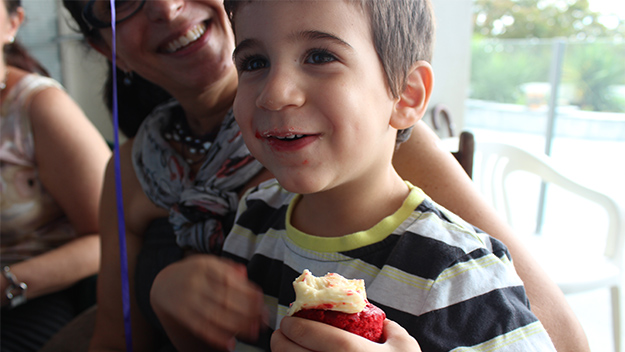Mitochondrial disease is poorly understood, rare and complex. It can also be fatal, taking the life of four-year-old Ari Rotolone in two short weeks. His parents are using his tragic death to educate others about this little-known condition.
It doesn’t take long for Vanessa’s tears to come. They fall thick and fast, as she remembers her beautiful brown-eyed son, Ari.
“He was so happy, healthy, full of life… he was bright as bright can be, brilliant in every way,” she says.
“He was hilarious. He would make us laugh, he had this incredible sense of comedic timing for such a young kid,” she adds, wistfully.
Ari sounds like your typical toddler, busy and cheeky, constantly on the go. He had had a few childhood illnesses, and while some had required specialist attention, nothing was so serious to warrant urgent medical assistance.
“When he was about three, Ari developed bouts of ataxia [problems with coordination and movement]. This was diagnosed as cerebellitis, as it developed after a virus, and we were assured by his paediatrician that with the right therapy and treatment he would recover fully from this condition.”
Retrospectively, there were other indications that not all was well with their little boy, as Ari struggled to see properly, “He would always ask us to turn the lights on – even in the daytime.” An ophthalmologist diagnosed optic nerve damage, indicating that Ari would have permanent issues with his eyesight. “These appeared to be two random episodes – neither were bad enough to have us worried that something worse would happen.”
In late January this year, a fortnight after his 4th birthday, Ari died after a short and sudden illness.
Vanessa struggles to recount her final memories of her son, sobbing as she remembers him. “He had tonsillitis for a week, but again – nothing that would ring any alarm bells beyond a normal illness. We had taken him to the hospital a few times for penicillin, and had spent the week in bed resting together.
“One afternoon he told me his tongue felt sore, and asked me to tickle it for him,” she says, “and I laughed, saying that wouldn’t make it feel better. He suddenly vomited, and I knew I had to get him to hospital… that was the last time I spoke to him.”
Ari had had a seizure, and he continued having seizures as he was taken to emergency in an Ambulance. He was sedated, and never woke again.
“I feel like I have stepped into someone else’s life, and someone else has mine. The last few months just seem like a blur.”
When reassured that she is brave for telling her story, to bring attention to this rare condition, she continues, explaining “I don’t want Ari to be forgotten. I want people to know how much we loved him, how much he lit up our lives. I want to write his name in the sky, and sing it from the rooftops.”
Vanessa and Mark, Ari’s Dad, are still waiting for test results to determine whether Ari’s version of mitochondrial disease was genetically acquired.
“Waiting for the results is like reliving our pain over and over again,” Vanessa explains. “It’s an ultimate loss of control, and it could take another year before we know how his disease was acquired. But we have to know”.
So, Ari’s Mum and Dad wait, never for a moment forgetting their beautiful brown-eyed boy, who had a sparkle in his eye.
Tomorrow local Brisbane restaurants are banding together for ‘Ari’s Food Safari’, a gourmet road trip to fundraise for the Australian Mitochondrial Disease Foundation. To find out more, please call (07) 3358 6658 or email [email protected]


